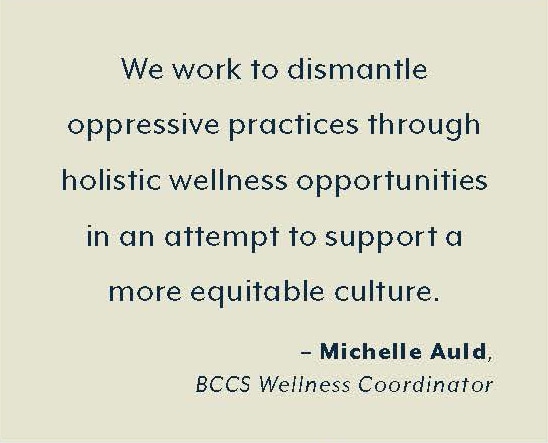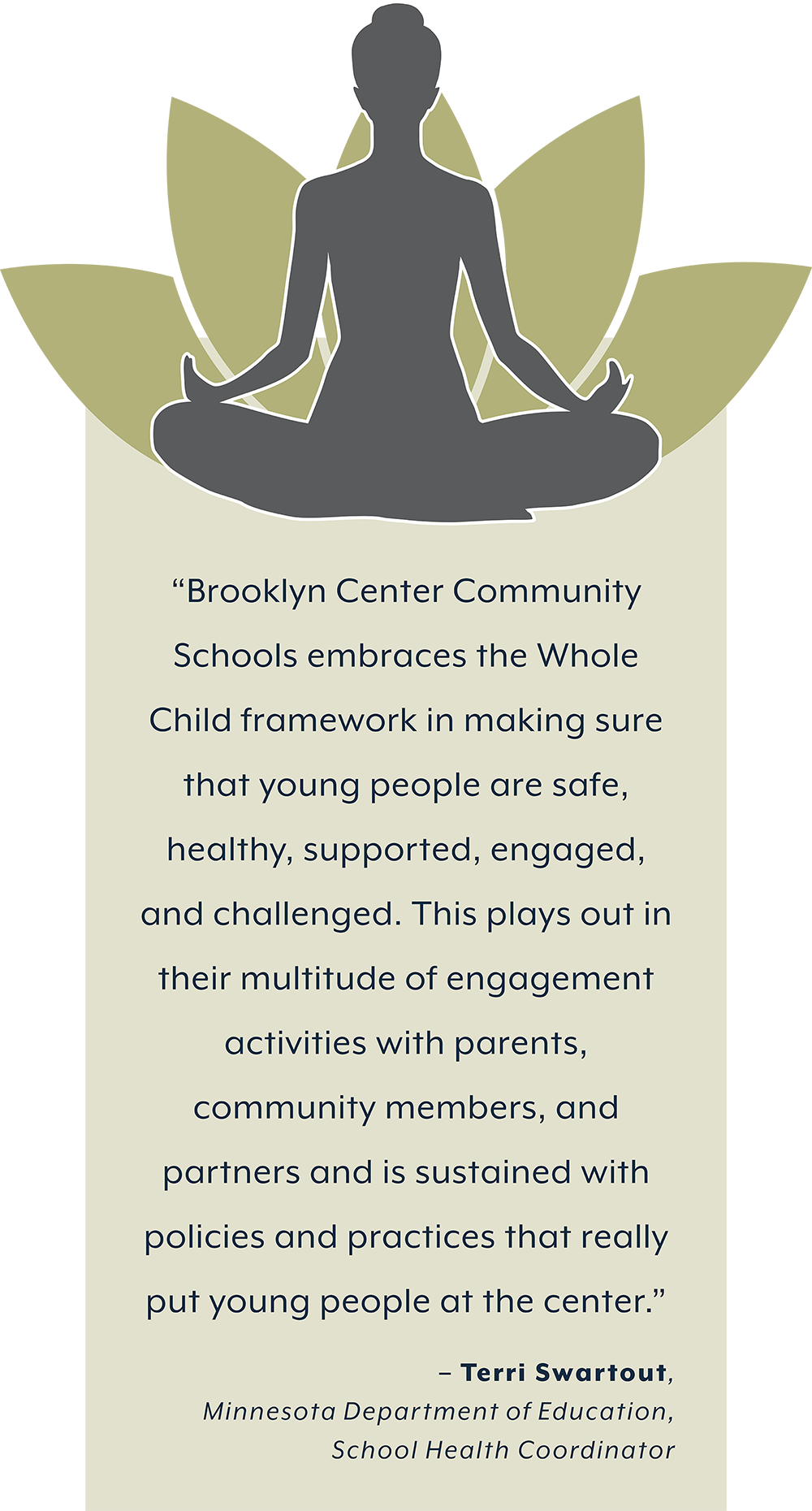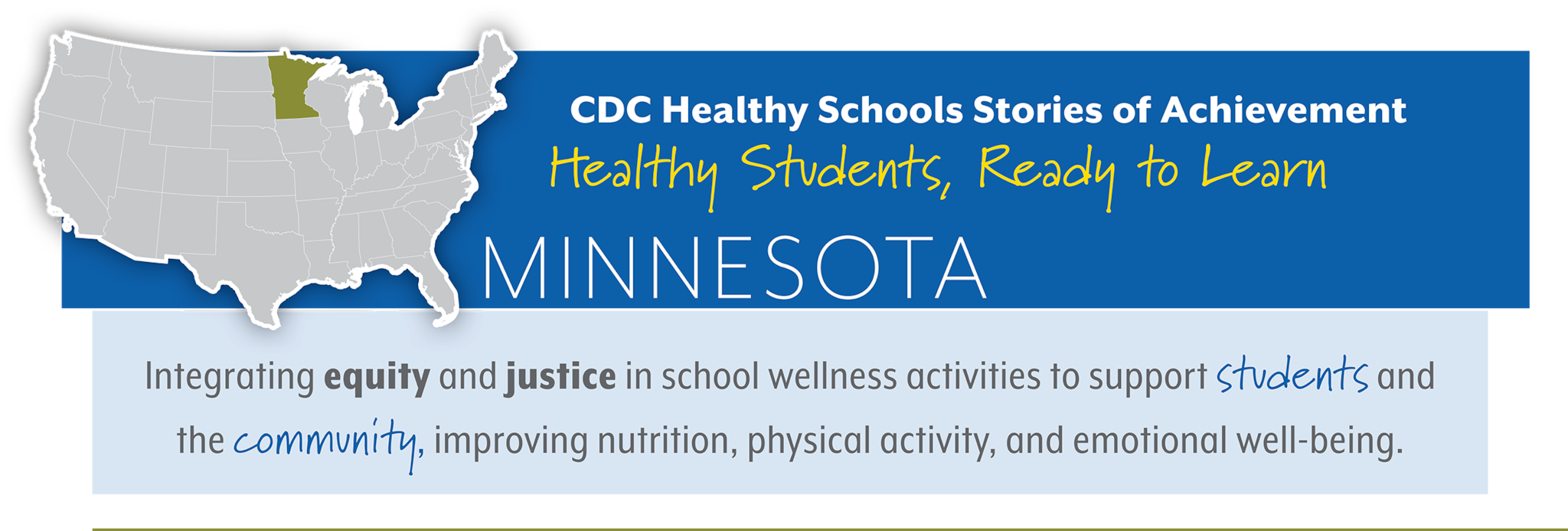Minnesota

Brooklyn Center Community Schools (BCCS), a small suburban school district near Minneapolis, Minnesota, serves a diverse population of students and families. Ninety-one percent of students are from racial and ethnic minority groups (50% Black, 24% Latino, 16% Asian, and 1% American Indian), and 21% are English language learners. About 20% of residents are immigrants or refugees, and 85% of students receive free or reduced-price lunch.
Because of systemic racism, these groups experience disparities in many domains, including health and education. Additionally, social injustices and social unrest events of 2020 and 2021 triggered trauma which was only compounded by the high rates of COVID-19 cases. When schools started remote learning because of the COVID-19 pandemic, families who already had limited access to resources for health and wellness now faced even more barriers. As a result, BCCS has increased its focus on equity to promote healing and improve health and wellness within the community.

BCCS implemented a number of health and holistic wellness interventions and took a hard look at school policies. In June 2020, the superintendent announced the district would work toward antiracist systems and equity. This shifted work in every department and team, including wellness, to a systems perspective. The school district also updated its mission statement to reflect that it wanted “to become a justice-centered school community who fuels the unique genius of each student.”
For one policy change, members of the school wellness committee provided input to the Equity Team for the district equity resolution, which was passed by the school board in October 2020. In July 2021, a second policy change was made when the wellness committee updated its district wellness policy. The wellness policy is based on the 8 Dimensions of Wellness, including equity, social and emotional development, nutritional education, environmental stewardship, and physical activity. Policy changes are a key outcome for sustained priorities and initiatives. The Minnesota 1801 team, which is composed of representatives of the Minnesota Department of Education and Minnesota Department of Health, supported BCCS in making these policy updates which impact over 2,300 students annually.

As a result of the policy updates:
- Snacks provided to students will align with USDA’s Smart Snacks Guidelines.
- Meal periods will be scheduled with enough time, as informed by CDC’s Making Time for School Lunch initiative.
- Staff will follow the district’s Unpaid Meal Charges procedures to protect students’ data privacy and will not use food or drinks as rewards and incentives for student behavior or academic performance.
- The district will support Farm-to-School programming with dedicated staff, resources, and land.
- Food Services will gather input from students, families, and community partners about local, cultural, and ethnic foods served.
- Staff wellness will be promoted via wellness activities, administrators modeling wellness behaviors, lactation accommodations, and access to the weight room.
- Adaptive physical education will be available for students with disabilities in grades K–12.
- Staff, students, community members, and partners can use some facilities for physical activity outside of school hours.
BCCS also has implemented trainings and events to promote wellness among students, staff, and community. The district adapted Spring Wellness Week to focus on healing, resilience, and community building by adding sessions for youth, families, and staff to process grief and other strong emotions, use movement, and address trauma. BCCS also collaborated with the Minnesota Department of Education to create a public training video series about mindful movement in schools. After the COVID-19 pandemic necessitated distance learning in the 2019–2020 school year, BCCS shifted to offering free online wellness opportunities that continued into the next school year. Events included a fall festival, a Black History Month Celebration, a soul food cooking series, and webinars on racial healing and yoga. BCCS also offered weekly wellness and nutrition activities through the Youth Leadership Council. Over 400 people participated in these events.

